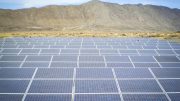The actions being formulated today will design the framework in which we will operate for the next two decades and shape the Europe of tomorrow. If the EU wants to stand a chance to hit its climate and energy targets, it needs to invest in technology innovation and digitalization, while fully deploying the potential of existing renewable technologies to drive the transition.
Yet, the “urgency of the action” should still allow a sound assessment to be at the basis of EU decision making. Short-sighted, ill-informed, and emotional rhetoric risks to pollute the public debate when it comes to the contribution of bioenergy in the transition of the EU economy towards a sustainable, inclusive and climate-friendly model.
In mid-2018 the talks between the European Parliament and EU member states on the renewable energy policy resulted in the recast of the Renewable Energy Directive (RED II), with at its core, the legally binding EU-wide target of 32% for renewable energy by 2030.
This Directive set the basis of the so-called sustainability criteria under which bioenergy has become the only form of energy with a guarantee of sustainable sourcing, irrespective of the geographic origin of the biomass. Coupled with a robust risk-assessment system, the REDII has put in place a procedure able to provide market stability: the industry is now gearing up to ensure compliance and further demonstrate accountability.
Today attempts to jeopardize the outcome of this transparent and inclusive legislative process that included stakeholders, EU policymakers and member states can be harmful to a whole sector and might slow down investment in sustainable technologies, a situation that Europe could not afford.
Considering that too often resources are still redirected towards fossil fuels, while the full potential of renewables is far from being exploited, political decisions must carefully consider the key role of bioenergy in Europe.
The European Green Deal represents a concrete chance to provide a long-term legislative framework to reinforce investors’ confidence in trusted solutions delivering GHG emissions savings and enabling decarbonization of the EU economy, building on a solid sustainability framework.
The environmental and socio-economic impacts of the bioenergy sector are tangible and have constantly increased over the years.
Since the year 2000, the indigenous energy production of renewables has steadily increased in Europe (+131%) and bioenergy’s absolute contribution to EU final energy mix has more than doubled. Representing almost 60% of the total renewable energy consumed in Europe, the bioenergy sector has a leading role to play in the low-carbon energy transition.
The biomass used for energy purposes in the EU is predominantly local: with only around 4% imports, bioenergy is an autochthonous energy source contributing to EU energy independence.
Bioenergy is one of the most affordable renewable energy technologies providing the right solution to energy poverty. Its versatility is allowing to decarbonise several EU sectors: buildings, power, transport, and industry. Sources of bioenergy are plentiful and, under the right conditions, can bring wealth and jobs to rural areas and enhance profit diversification derived from the use of marginal and abandoned lands.
The future of the bioenergy sector is intrinsically linked to the sustainability of the biomass feedstock and sustainable forest management at the same time. Bioenergy is a key tool for the achievement of European Green Deal aims.
Circularity
Bioenergy embodies the principle of circularity: sustainable biomass is sourced from forestry and forest-based industry leftovers, residues and wastes. Future initiatives on circular economy need to ensure the application of a market-based approach to resource efficiency.

An inclusive transition
Accounting for more than 700.000 direct and indirect jobs, a scale-up of bioenergy will contribute to delivering a jobs-rich transition for Europeans. Under the right framework, bioenergy can address some of the most notable socio-economic challenges related to the energy transition by enhancing the economic resilience of European regions and by fostering job opportunities across the continent.

GHG emissions savings
Energy is the source of 78% of GHG emissions in EU 28, with transport and heating sectors together being responsible for 45% GHG emissions. In 2017 thanks to bioenergy utilization, 303MtCO2eq were saved. This equals to 7% of EU28 GHG emissions, around the annual emissions of Spain. A higher GHG emissions savings target requires a holistic approach. First and foremost, coherent measures to gradually phase out fossil fuels subsidies. This must be accompanied by incentives to help industries and end-users covering the upfront cost linked to renewable solutions.
EU industrial strength
With more than 50.000 business units and an annual turnover of €60.6 billion, bioenergy has the potential to become a key industrial sector boosting EU economic development. To make this happen and for Europe to become the leader in the clean energy transition a sound EU industrial strategy must be put in place. It is fundamental to enable a competitive business environment and promote technology manufacturing and know-how in the EU through a stable market and regulatory framework.
Bioenergy cannot be simply dismissed based on ill-informed claims and emotional debates. Within the limits of a sustainably available feedstock, it provides versatile and flexible technologies in the heating & cooling, transport, and electricity sectors including even the possibility for negative emissions.
Bioenergy is a key player in the current and future energy mix and, along with other renewable energy sources, it is part of the puzzle to achieve our 2050 objectives. The bioenergy sector is ready, reiterates its full support in the transition to a low-carbon, more resource-efficient and sustainable economy.
06/02/2020






